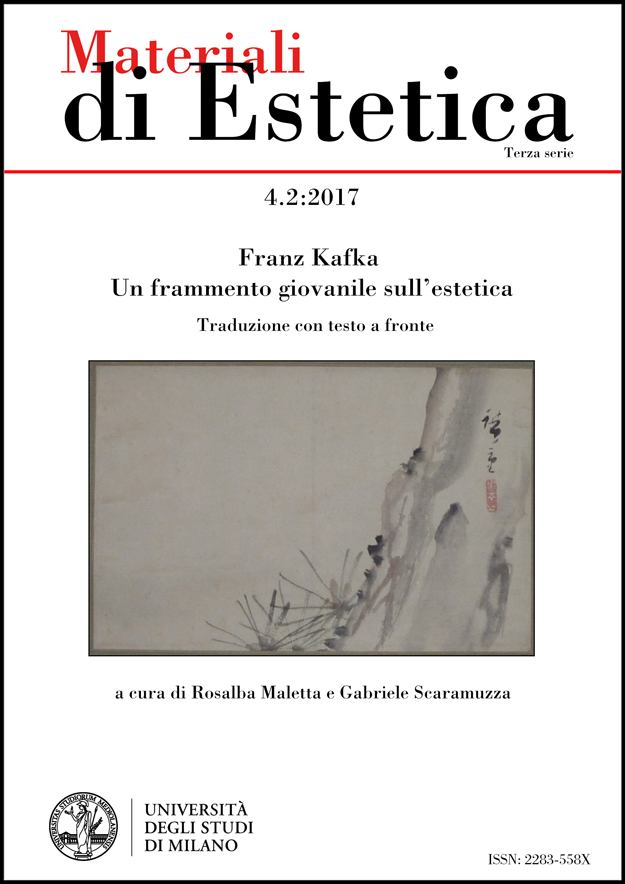Die Frage bleibt: resistenze all’opera. Attorno a un frammento di Franz Kafka
DOI:
https://doi.org/10.13130/mde.v0i4.2.9769Abstract
The paper analyses Kafka’s fragment as one of the first trace of the author’s creative journey. I will read Man darf nicht sagen in the complexity of Kafka’s literary work, investigating the recurrence of stylistic features such as negation, irony, uses of subjunctive and indicative verbal moods, as well as the semantic nuances of the German modal verb dürfen. Nevertheless, I won’t reduce such stylistic peculiarities to a mere linguistic exercise. I argue that Franz Kafka inscribes in Man darf nicht sagen the seeds, the signals of a never ending subjective confrontation with the question of transmission, memory, subjectivity, and testimony in name of an Otherness: in a word, with the question of the Law.
Keywords: Franz Kafka; Psychoanalysis; the Work of the Negative
Downloads
Riferimenti bibliografici
Bibliografia
ANZIEU, Didier, Le corps de l’œuvre, Essais psychanalytiques sur le travail créateur, Gallimard, Paris 1981.
–, Les traces du corps dans l’écriture in Psychanalyse et langage. Du corps à la parole, Dunod, Paris 1981.
AVITABILE, Luisa, “A proposito di un ‘testo’ di Pierre Legendre”, in «Et si omnes...». Scritti in onore di Francesco Mercadante, a cura di F. Lanchester, e T. Serra, Giuffré Editore, Milano 2008, pp. 19-41.
BROD, Max, Zur Aesthetik in Die Gegenwart, Bd. 69, pp. 102-104,118 sgg.
–, Ungedrucktes von Franz Kafka in Die Zeit, 22.10.1965, 27.
CULIOLI, Antoine, “La Négation: marqueurs et opérations”, in Recherche Sémiologiques, n. 5-6, 17-38 (1988).
DERRIDA, Jacques, Schibboleth. Pour Paul Celan, Galilée, Paris 1986.
Deutsches Wörterbuch von Jacob und Wilhelm Grimm, 16 Bde., Leipzig 1971 [1854-1961].
DICKINSON, Emily, The complete Poems of Emily Dickinson, edited by T. H. Johnson, Back Bay Books / Little, Brown and Company, New York-Boston-London 1961.
Dizionario di linguistica e di filologia, metrica, retorica, Einaudi, Torino 1994.
GELBER, Mark H. (Hg.), Kafka, Zionism, and Beyond, Conditio Judaica 50, De Gruyter 2015.
GREEN, André, Le discours vivant. La conception psychanalytique de l’affect, PUF, Paris 1973.
–, “La réserve de l´incréable”, in Créativité et/ou symptôme, Clancier-Guénaud, Paris 1982.
–, Narcissisme de vie. Narcissisme de mort, Les éditions de Minuit, Paris 1983.
–, Le Travail du négatif, Les éditions de Minuit, Paris 2011 [1993].
–, Commentaires après coup sur le Travail du Négatif, Colloque d’Athènes, 24-26 novembre, 2006 – http://www.psychoanalysis.gr/el/documents/Com_AG_Neg.pdf
JOHNSON, Samuel, Life of Boerhaave in The Works of Samuel Johnson, Pafraets Company, New York 1903.
KAFKA, Franz, Kritische Ausgabe der Schriften, Tagebücher und Briefe, Fischer, Frankfurt a. M. 1982.
–, Racconti, a cura di E. Pocar, Mondadori, Milano 1970.
–, Confessioni e Diari, a cura di E. Pocar, Mondadori, Milano 1972.
–, Lettere, a cura di F. Masini, Mondadori, Milano 1988.
LISKA, Vivian, When Kafka Says We. Uncommon Communities in German-Jewish Literature, Indiana University Press, 2009.
–, German-Jewish Thought and Its Afterlife. A Tenuous Legacy, Indiana University Press, 2016.
LYOTARD, Jean-François, Heidegger et les “juifs”, Galilée, Paris 1988.
–, “La prescription”, Rue Descartes, n. 1/2 (1991), pp. 239-254.
MALETTA, Rosalba, “Paul Celan: ‘Maikäfertraum’ e luogo delle origini”, in Studia Austriaca VIII, a cura di F. Cercignani, CUEM, Milano 2000.
–,“‘L’avventore intempestivo’. Alcune riflessioni sull’ultimo Kafka”, in Studia Theodisca IX, a cura di F. Cercignani, CUEM, Milano 2002.
–, “Paul Celan: poesia come resilienza. Francoforte, Settembre: ‘Un sogno di maggiolini’”, in La parola in udienza. Paul Celan e George Steiner, a cura di S. Raimondi e G. Scaramuzza, CUEM, Milano 2008.
–, “Eterotassie del Novecento. Dalla mela di Benjamin al pasto di neve di Celan”, in Psicoart, n. 3 (2013).
MEGHNAGI, David, Il Padre e la Legge, Marsilio, Venezia 2015.
MESCHONNIC, Henri, La rime et la vie, Verdier, Paris 1989.
ROBERTSON, Ritchie (Hg.), Kafka und die Religion in der Moderne, Königshausen & Neumann, Würzburg 2014.
–, “The Creative Dialogue between Brod and Kafka”, in M. H. Gelber (Hrsg.), Kafka, Zionism, and Beyond, Conditio Judaica 50, De Gruyter 2015, pp. 283-296.
SUCHOFF, David, Kafka’s Jewish Languages. The Hidden Openness of Tradition, University of Pennsylvania Press, Philadelphia 2012.
WIMMER, Gernot, (Hg.) Franz Kafka zwischen Judentum und Christentum, Königshausen & Neumann, Würzburg 2012.






